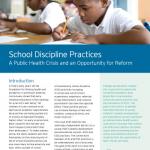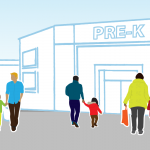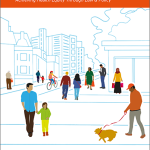Education
Episode 3: Policy solutions to address systemic racism in education
How does education policy connect to today’s broader conversation about racism as a public health crisis?
What are some examples of antiracist policies and practices in education settings?
Policy Solutions to Address Systemic Racism in Education examines examples of intersectionality in developing antiracist policies and practices for grades K–12, with a focus on race, gender, and disability. The panelists envision a new agenda for public health law that recognizes the fundamental importance of educational policies that oppose racism and promote health equity.
Expert Panel
- Alexis Etow, managing director at ChangeLab Solutions (moderator)
- Thalia González, associate professor at Occidental College and senior scholar at Georgetown University Law Center
- Kristen Harper, director of policy and outreach at Child Trends
- Charlene Russell-Tucker, acting commissioner of the Connecticut State Department of Education
- Ingrid Canady, executive director of the State Education Resource Center
- Ben Cairns, principal of Lake County High School
Highlights
Utilizing lessons from the pandemic, our panelists explore how to shape a policy agenda that disrupts historical harms in the education system, supporting students within a changing virtual and in-person environment.
It’s no accident that we started to put police officers in schools in the 1960s, when steps toward desegregation in schools were first happening. This is when we had the designation of pre-delinquent, which was the origin of our school-to-prison pipeline. ―Thalia González
Education and health: Educational attainment is directly related to better health outcomes. For example, by age 25, individuals with a high school degree can expect to live 11 to 15 years longer than those who did not complete high school. ―Alexis Etow
Racism and school policing: It’s no accident that we started to put police officers in schools in the 1960s, when steps toward desegregation in schools were first happening. This is when we had the designation of pre-delinquent, which was the origin of our school-to-prison pipeline. ―Thalia González
One thing we focus on is restorative justice; it has a fundamental value in building relationships. When the restorative justice process works authentically and things go sideways, the student has a voice and the teacher has a voice; they can hear each other and build that relationship. It’s an incredibly important tool that’s doable in any school and can be implemented right away. ―Ben Cairns
Restorative justice: One thing we focus on is restorative justice; it has a fundamental value in building relationships. When the restorative justice process works authentically and things go sideways, the student has a voice and the teacher has a voice; they can hear each other and build that relationship. It’s an incredibly important tool that’s doable in any school and can be implemented right away. ―Ben Cairns
Student data: The technical aspect of this conversation is the data and how it demonstrates the urgency of the moment. But the data are not just numbers, they’re students. They have personal histories. They have identities. We can't forget that when talking about solutions. ―Ingrid Canady
Special education: We need to think about equity as it relates to special education as well. Special education is a critical support for students who need it but also a source of exclusion that can have negative consequences. When we look at discipline, for example, we have to look at race and disability together. A quarter of black males with disabilities are experiencing out-of-school suspensions in a given year. ―Kristen Harper
Attendance policy: It is so important to have a careful definition of what counts as attendance in a virtual space. How do we maintain high standards while also responding to inequities and challenges that students may be going through? ―Charlene Russell-Tucker
School discipline reform: A positive note is that 32 states have reformed their punitive discipline laws, so there is movement toward countering that early and deeply embedded narrative about social control. But there is certainly still a lot of work to do. ―Thalia González
Watch a recording of episode 3:




